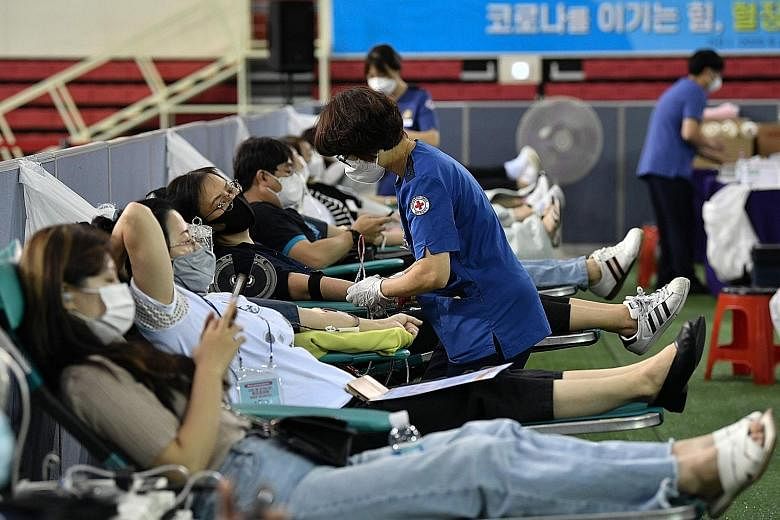SEOUL • South Korea recorded its 16th consecutive day of triple-digit rises in new coronavirus cases yesterday, extending a second wave of infections that is fanning concerns about a shortage of hospital beds in Seoul.
The Korea Centres for Disease Control and Prevention (KCDC) posted 308 new cases as of midnight on Friday, the majority of them in the capital and surrounding areas.
Outbreaks have continued to erupt at churches, offices, nursing homes and medical facilities, even after officials tightened social-distancing rules.
The spike in cases has depleted hospital facilities, with the health ministry reporting that just 4.5 per cent of beds in greater Seoul were available for critical cases as of Friday, down from 22 per cent a week earlier.
"Only about 15 beds are immediately available in the greater Seoul area for patients in critical condition as there were numerous patients who were in a serious condition and needed to be hospitalised," Mr Yoon Tae-ho, director-general for public health policy at the health ministry, said yesterday.
"But we should have a little more room shortly because more people are being released," he told a news briefing.
The KCDC said more than 1,000 cases have been traced to the Sarang Jeil Church in Seoul, which is at the centre of the new wave of infections. Its head, Reverend Jun Kwang-hoon, is an outspoken government critic who was also confirmed to have contracted the virus.
Dealing with the second wave of infections has been complicated by an ongoing strike of almost 16,000 intern and resident doctors. The medics walked out on Aug 21, in a dispute over the government's plans to boost the number of doctors to better deal with health crises like the coronavirus.
The health ministry last week filed a police complaint against at least 10 doctors and extended a back-to-work order for the doctors, who are the backbone of healthcare services in emergency rooms and intensive care units.
The striking doctors have volunteered at temporary testing centres to help with the outbreak, but major hospitals have reported delays and disruptions since their walkout.
"Doctors should be by the side of patients as we face the possibility of a nationwide transmission of Covid-19," Mr Yoon said yesterday.
"We are standing on the last line of defence to calm the spread in the Seoul metropolitan area, and if we fail at it, the only option we have left is to step up distancing rules to the highest level."
The government took the unprecedented step on Friday of restricting the operation of eateries in the capital area.
For a week starting today, onsite dining at restaurants, pubs and bakeries in the Seoul area will be banned after 9pm, while coffee shops, some of which have been identified as hot spots, are restricted to takeout and delivery.
Churches, nightclubs, gyms and most schools in the area are already closed, and masks are mandatory in public places.
Meanwhile, nearly 200 coronavirus survivors from the Shincheonji Church of Jesus, a secretive South Korean sect blamed for the country's early outbreak, donated blood plasma on Friday to help treatment research, as the group seeks to redeem itself.
Scientists have pointed to the potential for treatment using blood plasma containing antibodies to the virus from individuals who have recovered from Covid-19.
By far the South's largest contingent of coronavirus survivors is from the Shincheonji, which is often condemned as a cult. It is linked to more than 5,000 virus cases in the country.
Its elderly leader Lee Man-hee was arrested earlier this month for allegedly hindering the government's efforts to contain the epidemic.
More than 1,000 Shincheonji members are donating plasma over the course of a week.
Shincheonji has apologised "for causing much concern and worry to the people of Korea", the sect said in a statement, adding that its leader Lee had encouraged its members to donate.
Driven by several clusters, many of the latest cases are linked to Protestant churches in the Seoul region.
Shincheonji was heavily vilified back in February, and more than 1.4 million people signed a petition on the South Korean presidential office website demanding its dissolution.
REUTERS, AGENCE FRANCE-PRESSE











